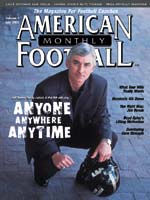AMERICAN FOOTBALL MONTHLY THE #1 RESOURCE FOR FOOTBALL COACHES
Article CategoriesAFM Magazine
|
Balance: Walking the Fine Line Between Career & Family ...© More from this issueI think the mentality of some football coaches today is this: To be successful, you have to eat, sleep, and coach football 24-7. Both players and coaches alike spend a major portion of their lives training, preparing for, playing in, and reviewing football games during the football season. Success in football for some coaches is a priority, which can lead to an unbalanced life. One purpose of mine is to help athletes and coaches gain perspective about playing and coaching sports and develop balance in their life. Both athletes and coaches begin with a great goal: To win football games or win championships. This underlying drive and desire is necessary to beco....The full article can only be seen by subscribers. Subscribe today!
|
|
|||||||
| HOME |
MAGAZINE |
SUBSCRIBE | ONLINE COLUMNISTS | COACHING VIDEOS |
Copyright 2025, AmericanFootballMonthly.com
All Rights Reserved





